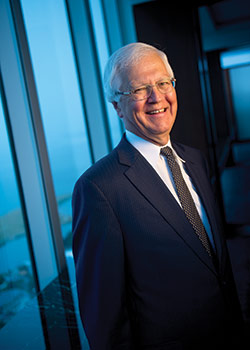Proposal to lay dead man’s statute to rest
By: Erika Strebel, [email protected]//July 28, 2016//
Judicial Council calling for repeal of antiquated witness-competency Standard

Wisconsin’s Judicial Council is asking the Supreme Court to put the final nail in the coffin of the state’s dead man’s statute.
In general, dead man’s statutes prevent witnesses from testifying under oath about a transaction that was reached with a person who has since died. The statutes are a vestige of common-law standards that were once used to gauge the competency of witnesses but are now seldom relied on in this country.
Dead man’s statutes, which have been abandoned in many U.S. jurisdictions, arise from a presumption that people will lie about their past transactions when the death of another partner has put to rest any fears of being contradicted, said Tim Edwards, a Madison trial lawyer who also teaches at the University of Wisconsin Law School.
Legal scholars have long criticized dead man’s statutes as being too restrictive. In fact, Wisconsin’s statute, contained in Wis. Stat. 885.16 and 885.17, was long ago deemed unusually far reaching.
And courts have already placed strict limits on when it can be used, said Tom Shriner, a member of the Judicial Council and long-time Milwaukee attorney.
“It’s been around for a long time, obviously,” said Shriner, a member of the evidence and appellate-procedure committee of Wisconsin’s Judicial Council, a body composed of lawyers, judges and other practioners who recommend changes to state court procedures.
“And the idea that it’s not a good idea goes back even into the 19th Century, when some of writers on evidence back at that time … criticized it as an impediment in the search for truth because it disables people from testifying on something that might resolve a dispute.”
Edwards said he thinks the goals behind the dead man’s statute can be achieved in ways that are not quite so restrictive.
“I think that the better approach is to create a standard in which the courts scrutinize the transaction and give it weight based on whether there are corroborating circumstances that support what the person asserts,” he said.
Taking out the dead man

The courts have already placed limits on when the dead man’s statute can be invoked but have had little success in putting the attendant concerns to rest.
“Courts can limit its application,” said Edwards. “There’s lots of terminology the court can work with but ultimately, it’s still there. The courts can’t just avoid it or ignore it.”
Shriner said that repealing the dead man’s statute would let an opposing party introduce evidence meant to undermine the credibility of witnesses who find themselves in the unusual position of having entered a transaction with a deceased person. Such evidence is already permissible for all other types of witnesses.
Edwards said that if the justices do repeal the dead man’s statute, the change is unlikely to be widely noticed. The statute, for one, is rarely invoked.
Lawyers who do encounter it from time to time will just have to adapt, Edwards said.
“They would need to understand that there will no longer be a complete ban on this type of evidence,” he said. “They would need to learn how to approach this differently. They wouldn’t be able to make an across-the-board objection.”
Long life for the dead man
The Judicial Council has been calling for repeal of the dead man’s statute since at least 1972, when it was petitioning the state Supreme Court to adopt rules of evidence. The court adopted those rules in 1974 but left the dead man’s statute on the books.
The justices’ decision arose in large part from a reluctance to overturn something that had been codified by the state Legislature — especially a law with so long of history. Wisconsin’s dead man’s statute dates to 1858.
Yet, whatever their reasons for being hesitant, the justices do in fact have authority to repeal laws involving the rules of evidence — especially if they have first given lawmakers an opportunity to take action on their own. Wisconsin’s Legislature has yet to take up the state’s dead man’s statute.
“We’re basically coming back 40 years later and saying, ‘It’s still a bad idea to have this. Let’s repeal it,” Shriner said.
Nothing guarantees, though, that there will be success this time around. The justices might still find that repeal would amount to too substantive a change and thus decide to dismiss the Judicial Council’s petition. Foreseeing that possibility, the Judicial Council has already made plans to respond with a draft repeal bill that could be introduced to state lawmakers next legislative session.
“We wanted to try to do it first in the court because we do think it’s a bad law and it does have the ability to repeal it,” said Shriner.
The Judicial Council submitted its proposal in April and the high court is planning to hold hearings on the request in its next term.
“I think the court is going to give this serious consideration,” Edwards said. “It’s very frequent to see the court and Judicial Council to agree on things.”
Mystery privilege
Although all the petitions the Judicial Council now has pending before the Wisconsin Supreme Court relate to the state’s rules of evidence, the council has chosen to divide them up into two groups: requests to repeal rules and requests to either create or amend the rules.
In addition to suggesting that the court repeal the dead man’s statute, the council is also asking the court to repeal Wis. Stat. 885.205, which creates a privilege for communications between students and deans of students or school psychologists. That privilege was enacted by the Legislature in the 1990s, but no one seems to know why, said Tom Shriner, a Judicial Council member and long-time civil practitioner who heads up the committee that drafted both petitions.
The privilege was brought to council’s attention by the Legislative Reference Bureau, which pointed out that the statute stands on its own but nonetheless overlaps with another statute that creates a privilege for communications between patients and their doctors and psychologists.
Shriner said the council couldn’t find anyone who opposes repealing the statute. Members of certain advocacy groups had initially objected but later changed their minds after reading the statute.
— Erika Strebel
Legal News
- Wisconsin attorney loses law license, ordered to pay $16K fine
- Former Wisconsin police officer charged with 5 bestiality felony counts
- Judge reject’s Trump’s bid for a new trial in $83.3 million E. Jean Carroll defamation case
- Dozens of deaths reveal risks of injecting sedatives into people restrained by police
- The Latest: Supreme Court arguments conclude in Trump immunity case
- Net neutrality restored as FCC votes to regulate internet providers
- Wisconsin Attorney General asks Congress to expand reproductive health services
- Attorney General Kaul releases update at three-year anniversary of clergy and faith leader abuse initiative
- State Bar leaders remain deeply divided over special purpose trust
- Former Wisconsin college chancellor fired over porn career is fighting to keep his faculty post
- Pecker says he pledged to be Trump campaign’s ‘eyes and ears’ during 2016 race
- A conservative quest to limit diversity programs gains momentum in states
WLJ People
- Power 30 Personal Injury Attorneys – Russell Nicolet
- Power 30 Personal Injury Attorneys – Benjamin Nicolet
- Power 30 Personal Injury Attorneys – Dustin T. Woehl
- Power 30 Personal Injury Attorneys – Katherine Metzger
- Power 30 Personal Injury Attorneys – Joseph Ryan
- Power 30 Personal Injury Attorneys – James M. Ryan
- Power 30 Personal Injury Attorneys – Dana Wachs
- Power 30 Personal Injury Attorneys – Mark L. Thomsen
- Power 30 Personal Injury Attorneys – Matthew Lein
- Power 30 Personal Injury Attorneys – Jeffrey A. Pitman
- Power 30 Personal Injury Attorneys – William Pemberton
- Power 30 Personal Injury Attorneys – Howard S. Sicula











